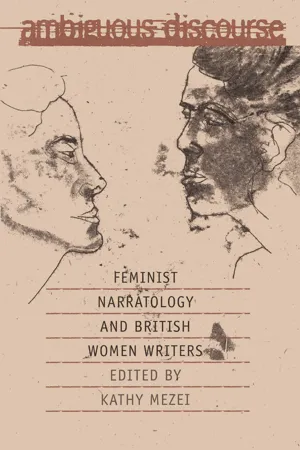
- 296 pages
- English
- ePUB (mobile friendly)
- Available on iOS & Android
About this book
Carefully melding theory with close readings of texts, the contributors to Ambiguous Discourse explore the role of gender in the struggle for narrative control of specific works by British writers Jane Austen, Virginia Woolf, Anita Brookner, Angela Carter, Jeanette Winterson, and Mina Loy. This collection of twelve essays is the first book devoted to feminist narratology — the combination of feminist theory with the study of the structures that underpin all narratives. Until recently, narratology has resisted the advances of feminism in part, as some contributors argue, because theory has replicated past assumptions of male authority and point of view in narrative. Feminist narratology, however, contextualizes the cultural constructions of gender within its study of narrative strategies. Nine of these essays are original, and three have been revised for publication in this volume. The contributors are Melba Cuddy-Keane, Denise Delorey, Rachel Blau DuPlessis, Susan Stanford Friedman, Janet Giltrow, Linda Hutcheon, Susan S. Lanser, Alison Lee, Patricia Matson, Kathy Mezei, Christine Roulston, and Robyn Warhol.
Frequently asked questions
- Essential is ideal for learners and professionals who enjoy exploring a wide range of subjects. Access the Essential Library with 800,000+ trusted titles and best-sellers across business, personal growth, and the humanities. Includes unlimited reading time and Standard Read Aloud voice.
- Complete: Perfect for advanced learners and researchers needing full, unrestricted access. Unlock 1.4M+ books across hundreds of subjects, including academic and specialized titles. The Complete Plan also includes advanced features like Premium Read Aloud and Research Assistant.
Please note we cannot support devices running on iOS 13 and Android 7 or earlier. Learn more about using the app.
Information
Index
- Absence: in Woolf’s works, 96–97, 100, 106–7; of mothers, 128–31, 229–31; of dialogic, 144–45, 153, 162–63; of information about narrator’s gender, 250, 252, 254, 257–58. See also Other; Silence
- Ackerman, Robert, 157 (n. 6)
- Agentless expressions, 15, 215, 220–22, 224, 226–28, 231
- A la recherche du temps perdu (Proust), 250, 259
- Alice Doesn’t (de Lauretis), 240
- Ambiguity (indeterminacy): as feminist narratology focus, 2, 10, 238–61; about gender, 15, 71, 72, 76–79, 83–86, 88 (n. 20), 238–60; Austen’s, about marriage, 58–59; of free indirect discourse, 67–69, 71, 72; about gender roles, 70–71; in Hotel du Lac, 228. See also Parenthetical
- Ana Historic (Marlatt), 265
- Androgyny, 246, 247
- Anger, 153–56
- Anonymity (of narrator), 88 (n. 21)
- Arac, Jonathan, 189
- Ardis, Ann, 7
- Aristotle, 17 (n. 3)
- Armstrong, Nancy, 52
- Art. See Writing
- Asphodel (H.D.), 119
- Auerbach, Erich, 104–5
- Austen, Jane: as feminist writer, 1, 7, 10, 21–66, 70–75; gendered implications of focalization by, 11–12, 22–38, 66, 72–78; class versus gender solidarity in, 12–13, 33–34, 40–64; marriage plots in works by, 34, 45–46, 49, 73–75, 87 (n. 13), 123–24; narrators in works by, 58, 69, 77, 82, 83, 86. See also titles of individual works
- Author: feminist narratology’s study of, 2; parallels between textual subject and its, 13, 126–27; implied, 66, 69, 78, 254; struggles between narrator, character, and, 66, 67, 69, 70–81. See also Narrator; Self-censorship
- “The Authorial Mind and the Question of Gender” (Schabert), 11
- Authority: women writers’ reactions to, 10, 66; Austen’s, 58, 82; narrative, 58, 66, 68, 70, 74–77, 82; Forster’s, 77–79, 82; Woolf’s alternatives to, 81–86, 139–59, 163–86. See also Author; Narrator
- Autobiography, 5, 119, 265
- Autodiegetic realm, 250, 253–54, 256, 257
- The ...
Table of contents
- Cover Page
- Ambiguous Discourse: Feminist Narratology and British Women Writers
- Copyright Page
- Contents
- Acknowledgments
- Introduction: Contextualizing Feminist Narratology
- The Look, the Body, and the Heroine of Persuasion: A Feminist-Narratological View of Jane Austen
- Discourse, Gender, and Gossip: Some Reflections on Bakhtin and Emma
- Who Is Speaking Here?: Free Indirect Discourse, Gender, and Authority in Emma, Howards End, and Mrs. Dalloway
- Parsing the Female Sentence: The Paradox of Containment in Virginia Woolf’s Narratives
- Spatialization, Narrative Theory, and Virginia Woolf’s The Voyage Out
- The Rhetoric of Feminist Conversation: Virginia Woolf and the Trope of the Twist
- The Terror and the Ecstasy: The Textual Politics of Virginia Woolf’s Mrs. Dalloway
- Seismic Orgasm: Sexual Intercourse and Narrative Meaning in Mina Loy
- Ironies of Politeness in Anita Brookner’s Hotel du Lac
- Angela Carter’s New Eve(lyn): De/En-Gendering Narrative
- Queering Narratology
- Coda. Incredulity toward Metanarrative: Negotiating Postmodernism and Feminisms
- Select Bibliography on Feminist Narratology
- Notes on the Contributors
- Index